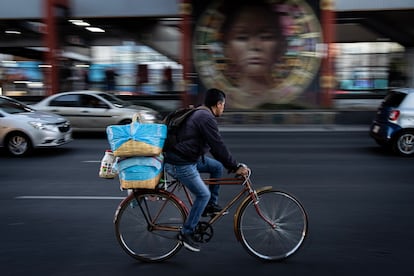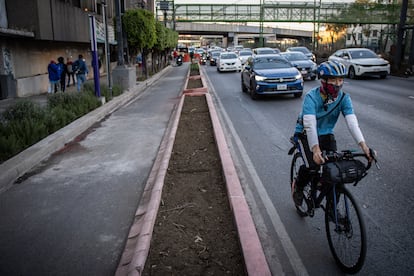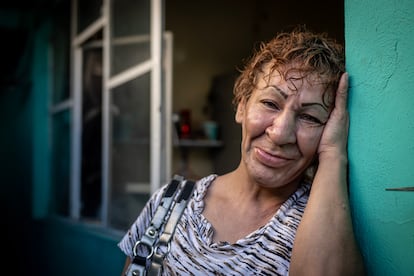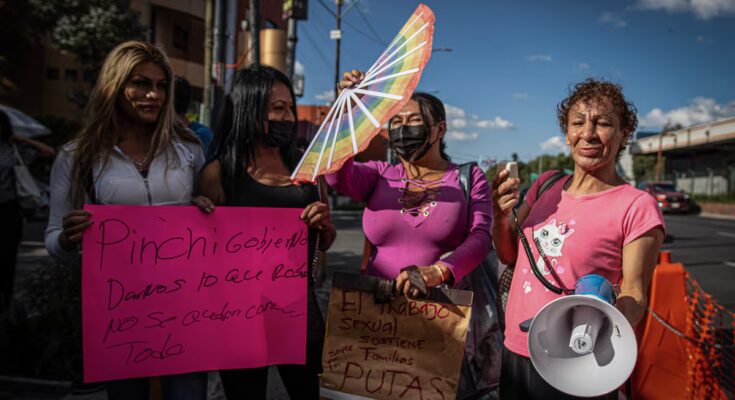Sandra Montiel (48 years old, Xalapa, Veracruz) has been working in this sector for 30 years and is not easily scared. “I’m used to those attacks,” she says. He remembers the times when the police carried out operations in the area with helicopters to intimidate them and he states this with certainty. “We are still here. We will not give up or be defeated by a World Cup.” She is referring to the latest obstacle faced by prostitutes on the Tlalpan road: construction work on a cycle path where they are usually found. According to their calculations, their income has already decreased between 70 and 80%. In a calm but firm tone, she asks for her work to be recognized and dignified: “We are part of the city. Since we are sex workers, we don’t live for free and we don’t pay taxes. We are part of the citizenry like the mariachis, the boleros, those who sell food on public streets or those who sell sweets. We also have the right to work on the streets.”
Greater Tenochtitlán is a project of the Government of Mexico City which involves the construction of 34 kilometers of cycle path, from Plaza Tlaxcoaque (in the centre) to the Periférico Ring in the south, as well as the construction of an elevated corridor on Line 2 of the Metro of almost two kilometers which will function as a pedestrian promenade. It is part of the plans that the capital’s government has announced to prepare the city that will host the 2026 World Cup. Clara Brugada, head of government, had assured a few months ago in a press conference that it will be “one of the best cycle paths”, but not everyone is celebrating the plan. “It hurts us too much,” says Zuleyma Martínez, who has worked at Tlalpan “on and off” since 2017. She complains that since they started building the project almost four months ago, she and her colleagues have had to “fight with cars and bicycles” to reach their customers, which puts them in danger.
Since August 19, various groups of sex workers have protested up to five times against this project which, they claim, they were not informed about and which concerns them directly. Arlen Palestine, head of the legal area of the civil association Brigada Callejera de Apoyo a la Mujer Elisa Martínez, claims that they were not taken into consideration and recalls the ruling of the amparo trial 112/2013, which recognized them as unpaid sex workers. “The Mexico City government had an obligation to carry out a public consultation,” he says. According to this organization, there are approximately 7,200 prostitutes on the street and 80% of them are housewives. In a video call with EL PAÍS, Montiel defends the mobilizations: “We have the right to express ourselves and demand respect for our work spaces.”
According to the government secretary, César Cravioto, seven working groups were held with sex workers until September 9th to listen to them and reach agreements. The result of one of these was the creation of 58 inclusion points “to allow the population to access mobility options” and “carry out their daily activities”. This means that sex workers will have to cross the cycle path and share space with public transport and taxis to approach vehicles. “It’s like being in a ball. I think what they give us is very little”, criticizes Martínez, who also believes that the inclusion points are not enough.

Megan García, who has been working as a prostitute in Tlalpan for 15 years and created the civil association Lucha y Fuerza Trans, thinks that, although they are exposed to accidents when crossing the cycle path, the inclusion points have helped: “They give us the opportunity to work.” He says that in one of the first working groups set up, some of them proposed establishing a dress code and a program to “collaborate with neighbors and authorities” and that, in this way, they could enter the streets of the surrounding neighborhoods to approach their clients’ vehicles more safely.
But not all sex workers support the idea. From the Street Brigade, Palestine denounces an imposition that, according to it, the government wants to “sell as a recommendation” for those who have not reached that agreement. “Why don’t you recommend it (the dress code) to your secretaries or deputies? Why don’t you recommend it to housewives who come by in the morning or to mothers when they go to meetings (at school)?” question the authorities.
Montiel, who is also against the proposal, says it is an affront to his human rights. “We all have the right to dress however we want.” As for the timetables, Martínez believes that they would not work. “We have many colleagues and mothers who already have their schedules scheduled and move them. Everything is changing. People who are mothers take care of their children (and control) whether they go to school,” she explains. She, who also works in a beauty salon from 9am to 9pm, could not accept that measure.
A drive around the area on a Friday afternoon shows the road chaos generated by the construction. Among the people walking with suitcases and boxes along a still incomplete cycle path, the most visible users do not travel by bicycle. “They’re taking advantage of it,” a neighbor in the Obrera neighborhood complains of the motorcyclists. A clerk at a hardware store near the Chabacano subway says wryly, “I think it’s occupied more by motorcycles.” With no police in sight, motorcyclists move quickly along the bike path to avoid heavy traffic on the road.

Meanwhile, cyclists, forced to share space with motorbikes, must also avoid cars parked in their lane. But the danger doesn’t end there. Pedestrians are also exposed to accidents if they have to cross the cycle path to take public transport. A neighbor in the La Moderna neighborhood complains about the planters installed between the road and the cycle path because they block the truck stops. “The bus stops in the second lane, but leaves you on top of the planter. I think they should plan this better,” he says.
In a press conference on November 12, César Cravioto reported that the project is going “very well” and that progress is already 60%. “The Tlalpan cycle path is advancing significantly,” he commented. The government secretary made no reference to requests from sex workers or complaints from neighbors about the risk of accidents. The latter demonstrated last Thursday because, they claim, they were not consulted on a project that affects businesses in the area and causes a lot of traffic.
Regarding the latter, Cravioto only asked for an apology for the road chaos caused by the works. According to García, the last encounter the sex workers had with the authorities occurred a month ago. He also accuses the government of failing to keep its promise to grant them unemployment insurance for the damage that the construction of the cycle path has caused them. For Martínez, this program through which they would receive financial support of almost 3,500 pesos a month for three months solves nothing. “Not only will we eat for three months. Not only will we pay rent for three months,” he says.

Montiel is outspoken. “When we go out on the street, we go to work. We go to earn a living and that of our families,” he says, explaining how thanks to his work he has helped his mother, his brothers and his nephews, and has been able to buy a house, although at the moment he is facing another problem because his property has been invaded. Even the more than 60 reconstructive surgeries and numerous dermatological treatments he underwent after the acid attack he suffered 24 years ago were paid for thanks to sex work. Their request to the authorities is simple: “That we be allowed to continue to carry out our work freely.”



